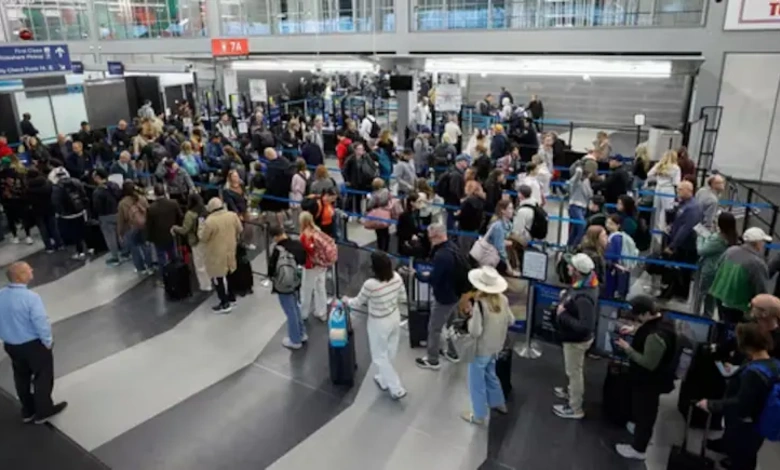Washington: After 40 grueling days of a federal government shutdown that has grounded flights, imperiled food aid for millions and left countless public servants without paychecks, a fragile compromise is emerging in the Senate. Yet, with deep partisan rifts and no ironclad assurances, the path to resolution remains fraught with uncertainty.
A trio of centrist voices—Sens. Jeanne Shaheen and Maggie Hassan of New Hampshire, alongside independent Sen. Angus King of Maine, all former governors—have hashed out a preliminary accord. It calls for approving three key spending measures outright while pushing the remainder of federal funding through to late January, sources close to the negotiations revealed, speaking on condition of anonymity ahead of any formal announcement.
This framework hinges on Republicans committing to a Senate vote by mid-December on extending tax credits under the Affordable Care Act, set to lapse on January 1. Those subsidies have been the shutdown’s flashpoint, making health coverage more accessible for lower-income Americans. However, the proposal stops short of immediate action on the credits, prompting sharp rebukes from within Democratic ranks.
ALSO READ : US Government Shutdown under Trump Costs $400 Million a Day, 750,000 Workers Furloughed
Senate Democratic Leader Chuck Schumer, after a marathon caucus session exceeding two hours, declared he would cast a “no” vote. Sen. Bernie Sanders of Vermont, who aligns with Democrats, labeled any concession at this juncture a “horrific mistake,” particularly amid ongoing pressure from former President Donald Trump.
On the Republican side, efforts to collaborate with these moderates have gained traction amid the chaos. The shutdown’s toll is mounting: Airlines scrapped over 2,000 flights on Sunday alone—the first such mass cancellation since the impasse began—while delays topped 7,000, per data from FlightAware. Treasury Secretary Sean Duffy warned on CNN’s “State of the Union” that Thanksgiving air travel could dwindle to a “trickle” without swift action.
Food insecurity is another casualty. Delays in Supplemental Nutrition Assistance Program benefits have ensnared tens of millions, exacerbated by legal skirmishes. Over two dozen states have flagged “catastrophic operational disruptions” as the Trump administration pushes to reverse court-mandated payouts following a U.S. Supreme Court stay. In the nation’s capital, where unpaid federal workers abound, the Capital Area Food Bank reports a 20% surge in meal distribution, delivering 8 million extra servings this fiscal year.
Majority Leader John Thune, R-S.D., hinted at progress earlier Sunday, noting a deal was “coming together” but demurring on explicit backing. “We’ll see where the votes are,” he added cautiously. Trump, fresh from a White House return after a football outing, offered a tepid nod: “It looks like we’re getting close to the shutdown ending,” though he stopped short of endorsement.
Democrats have rejected 14 reopening bids to date, insisting on health subsidy safeguards. Republicans, meanwhile, have rebuffed talks on the issue during the closure but warmed to the moderates’ blueprint in recent days. The pact would revive laid-off federal employees via reversal of reduction-in-force notices, reimburse states for self-funding federal operations, and shield workers from further cuts through January—ensuring back pay for all once resolved.
Sen. Tim Kaine, D-Va., whose state hosts vast federal payrolls, signaled support: “To earn my vote, we need to be on a path toward fixing Republicans’ health care mess and to protect the federal workforce.”
Republicans require just five Democratic crossovers to advance, and insiders estimate 10 to 12 senators are on board—enough, potentially, to break the logjam on a mere promise of a future health vote. Yet dissent simmers. Sen. Elissa Slotkin, D-Mich., voiced frustration over the lack of “something concrete” on health care. In the House, Rep. Greg Casar, D-Texas, chair of the Congressional Progressive Caucus, decried it as “capitulation” on X, not compromise, endangering families reliant on Democrats’ resolve. Rep. Angie Craig, D-Minn., quipped that believers in this as a true “deal” might fancy a bridge purchase.
Even if the Senate advances, procedural hurdles loom: Opponents could drag debate for days, with an initial procedural vote possibly Sunday evening.
The health credits’ fate is murkier still. House Speaker Mike Johnson, R-La., has declined to pledge a chamber vote. While some Republicans eye extensions to avert premium spikes—coupled with eligibility tweaks and rerouted funding—others, including Trump, rail against the Affordable Care Act. “THE WORST HEALTHCARE FOR THE HIGHEST PRICE,” he posted Sunday, reviving long-standing calls to dismantle or revamp it.
In parallel, Republicans unveiled finalized text for three full-year spending bills, maintaining congressional pay freeze while allocating $203.5 million more for lawmakers’ security amid rising threats. A nod to Sen. Mitch McConnell, R-Ky., bars sales of certain hemp-derived goods.
